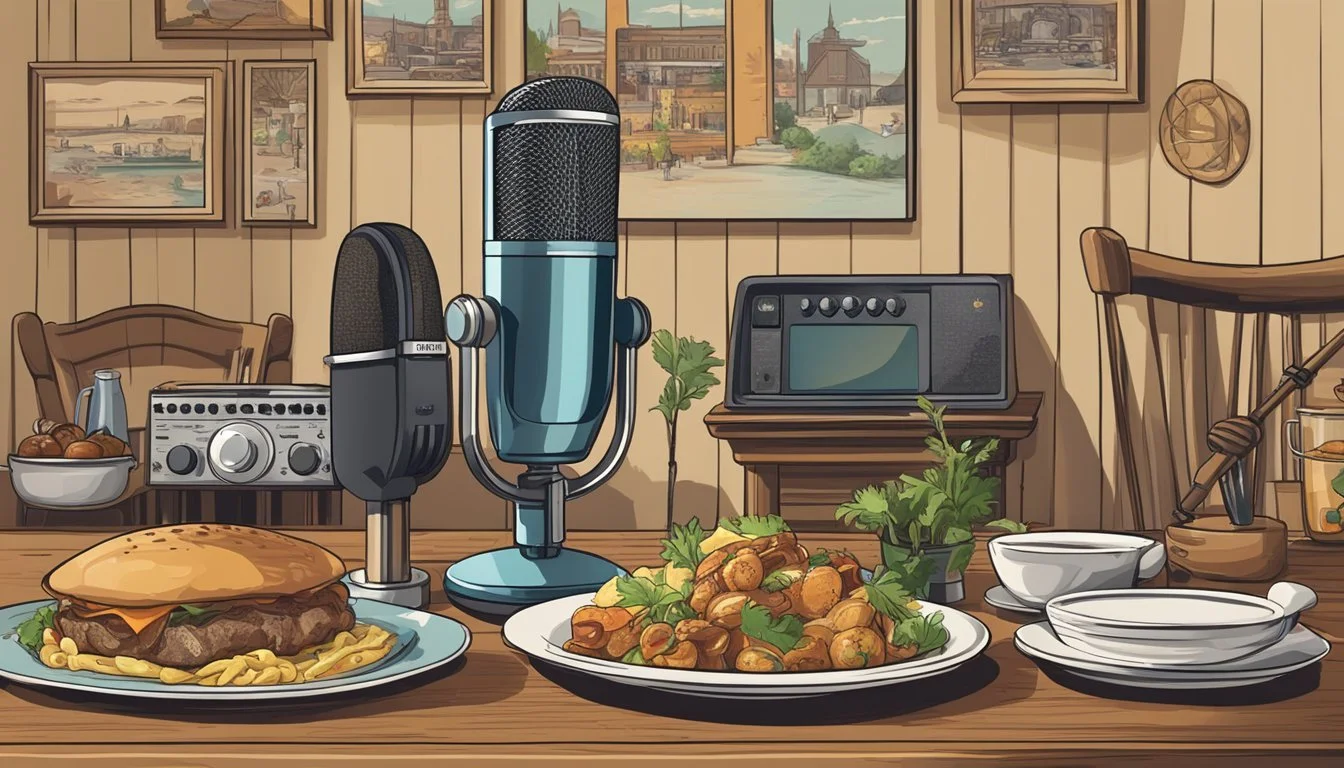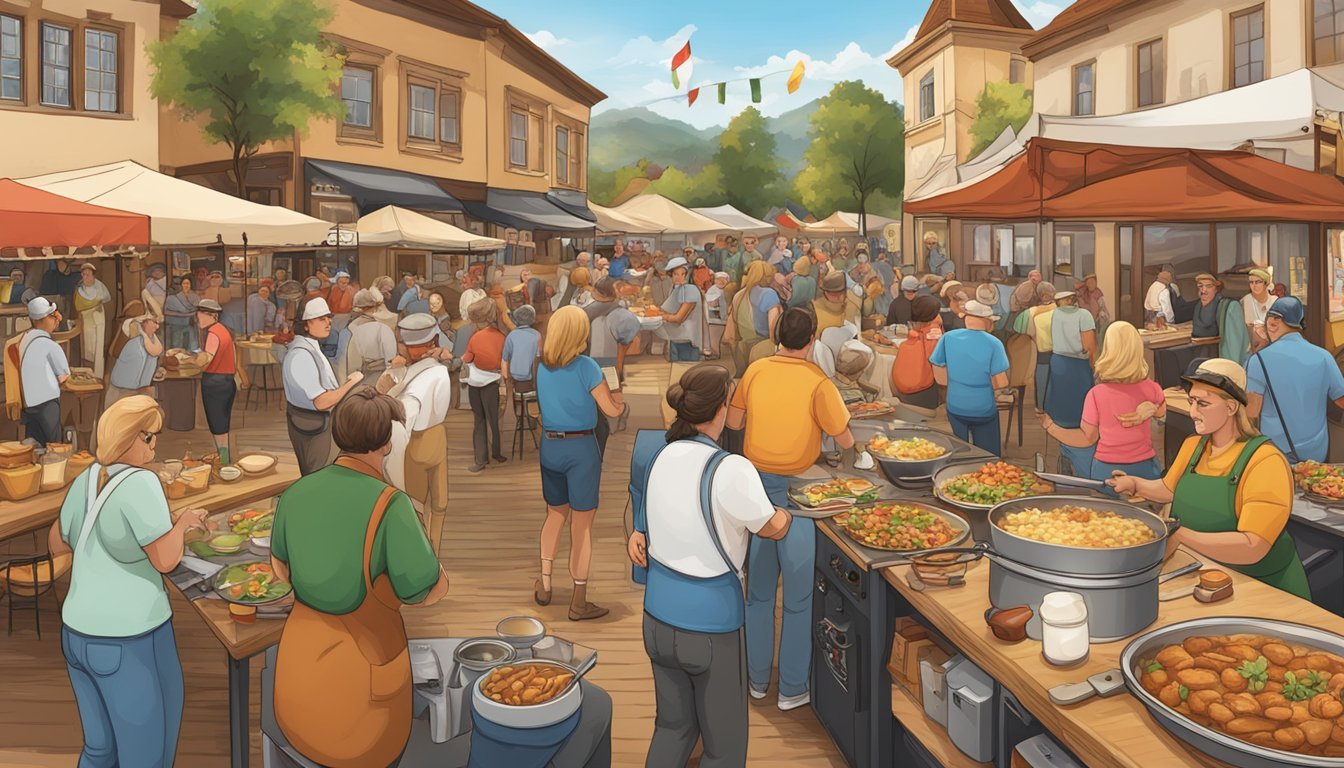The History of German Texan Food Radio and Podcasts
A Cultural Culinary Journey
The influence of German culture on Texas is a unique intersection of two distinct culinary and media traditions. German immigrants played a pivotal role in shaping the culinary landscape of Texas, a legacy that endures through festivals like the Wurstfest and the popularity of sausage and beer in the state's cuisine. This has also been reflected in local media, where programs and podcasts dedicated to exploring the rich history and tradition of German influence on Texan food have emerged, engaging a diverse audience interested in the gastronomic heritage.
Focusing on this niche, several podcasts have contributed to a renewed interest in the German-Texan culinary narrative. The 'History of the Germans Podcast', for example, offers a comprehensive view tracing the origins and evolution of the German community in Texas. Storytelling through media like radio and podcasts has succeeded in bridging the past and present, allowing listeners to explore the intricate web of history, food, and tradition from the convenience of their digital devices.
Moreover, Texas's food radio scene occasionally highlights the fading Texas German dialect, which includes unique culinary terms, underscoring the intimate relationship between language and cuisine. With an audience tuning in to specialty shows and segments, these platforms serve as custodians of cultural history, as well as a source of entertainment and education about the fusion of German and Texan gastronomy.
Origins of German Texan Culture
The German influence on Texan culture began in the early 19th century when a significant influx of German migrants settled, developing distinct enclaves that have left a lasting impact on the region's dialects and societal structure.
Early German Migrants to Texas
German migration to Texas started around the 1830s. Many were spurred by the promise of new opportunities and the appeal of vast lands. By 1848, waves of German migrants had established pivotal communities throughout Texas, particularly in the state's central region, known as the Hill Country. Cities like Fredericksburg, New Braunfels, and Boerne became centers of German-Texan life.
Settlement Patterns and Society
These early settlers brought with them a strong sense of community and tradition, clustering in enclaves throughout the south-central part of Texas. They primarily engaged in farming and quickly became an integral part of Texas's social fabric. Their impact is seen in various societal aspects, from culinary traditions to architectural styles.
Key Settlements:
New Braunfels (founded in 1845)
Fredericksburg
Boerne
Occupations: Predominantly farming and ranching
German Texan Dialects
The melding of German traditions with the linguistic tapestry of Texas gave rise to unique German Texan dialects. These dialects, often referred to as Texas German, are spoken by descendants of the original German settlers. While less prevalent today, these dialects are an essential component of the region's cultural heritage and reflect the enduring legacy of the settlers' German ancestry.
Characteristics of Texas German:
Mix of 19th-century German dialects
Influences from English and regional linguistic features
Regions with Texas German:
Central Texas' Hill Country
Present in older generations and cultural preservation efforts
German Influences on Texan Cuisine
The German legacy in Texan cuisine is present in the savory meats, robust beers, and sweet bakery items that have been woven into the fabric of Texas's food culture.
Classic German Texan Foods
German settlers significantly impacted Texan cuisine by introducing a variety of meats prepared with traditional European methods. Sausages are a prime example of this influence, with a wide range of flavors and types now integral to the Texan diet. Pork and lamb are commonly used in these sausages, which showcase the unique blend of spices favored by German settlers.
Schmidt Family Barbecue: Notable for their sausages.
Pork Sausage: A staple with garlic and sage.
Beef Sausage: Smoked and seasoned to perfection.
Kreuz Market: Renowned for its legacy in meat preparation.
Original Smoked Sausage: A blend of beef and pork with a signature snap.
Jalapeño Cheese Sausage: A Texan twist with spicy jalapeños.
Brewing Traditions and Beer Culture
German immigrants brought with them a strong beer culture that has thrived in Texas. Their expertise in brewing created a beer scene marked by quality and variety. The proliferation of microbreweries across Texas continues to honor the German dedication to excellent brewing.
Altstadt Brewery: Craft beers with German roots.
Kölsch: Traditional style, light and crisp.
Hefeweizen: A wheat beer with fruity notes.
New Braunfels Brewing Company: Small-batch beers with German influences.
Blonde Ale: Refreshing with subtle malt complexities.
Dunkelweizen: Darker, malty flavor profile.
Contribution to Texan Bakery and Confectionery
The German impact is also sweetly noted in the bakeries across Texas. Here, one can find pastries and bread with roots in German traditions now considered Texan staples. The fusion of these confectionery methods has led to a unique blend of flavors savored by locals and visitors alike.
Naegelin's Bakery: The oldest bakery in Texas with German beginnings.
Strudel: Flaky pastry with various fillings.
Pfeffernüsse: Spiced cookies, a holiday favorite.
Fredericksburg Bakery: Known for their artisan breads.
Sourdough: A tangy, robust bread.
Pumpernickel: Dark, dense, and slightly sweet.
Cultural Celebrations and Society
The German Texan community has a rich tradition of cultural celebrations that involve music, art, and especially beer, reflecting their societal ties and historical roots.
Oktoberfest and Texan Beer Festivals
Oktoberfest, the renowned beer festival originating from Munich, Germany, has found a significant foothold in Texan culture. Locations such as Fredericksburg, New Braunfels, and Austin host annual celebrations that honor this tradition. They feature a variety of German and Texan beers, traditional German music, and dance, thereby preserving German Texan heritage. During Prohibition, these celebrations were undercut, but they re-emerged stronger, signifying resilience and cultural pride.
Fredericksburg: Emphasizes artistic displays and music alongside beer tasting.
New Braunfels: Known for Wurstfest, a homage to sausages and beer, attracting over 100,000 visitors.
Austin: Combines local craft beers with German staples, inviting families and enthusiasts alike.
Social Contributions and Societal Impact
German Texans have profoundly influenced Texan society beyond festivals. They established social clubs and organizations to sustain their cultural practices and language, such as the German Texan Heritage Society. These entities play a crucial role in community cohesion, offering language classes and genealogy resources, and fostering social connections. Their impact is seen in the preservation and celebration of the unique Texas German dialect and in the series of traditional festivals that contribute to the local economy and cultural landscape.
German Texan Heritage Society
Language and Education: Provides German language education for all ages.
Cultural Events: Hosts events like Maifest, Oktoberfest, and Christmas markets.
Economic Contribution: Festivals and events significantly boost local tourism and businesses.
Cultural Preservation: Maintains traditional crafts, culinary arts, and the Texas German dialect.
Media Evolution and Communication
Media evolution in German-Texan culture vividly illustrates how communication has evolved from traditional print media to modern digital platforms, reflecting changes in technology and society.
The Role of Print and Literature
In the 19th century, German immigrants in Texas relied on print media for communication and the preservation of their culture. The usage of literature was instrumental in maintaining the German language and traditions within the community. For instance, German newspapers, often published by local Lutheran churches, played a crucial role in community cohesion.
Transition to Radio Broadcasting
By the 20th century, radio broadcasting became a pivotal medium in disseminating information and entertainment. Institutions like the University of Texas may have contributed to the study and advancement of radio technology, which allowed for the faster spread of information across vast distances. German-Texan radio programs would have carried on the legacy of maintaining cultural ties, serving as a bridge between the old world and the new.
Podcasts and Digital Transformation
The advent of podcasts marked a significant leap in the digital transformation of media. German-Texans, as part of the larger Texas fabric, now have access to a plethora of digital content with platforms like Apple's podcast ecosystem reshaping personal media consumption. Podcasts offer an on-demand listening experience, a significant departure from the scheduled programming of traditional radio.
Modern German Texan Identity
The German Texan identity today is a blend of historical roots and contemporary culture, contributing to the state's diverse society. Efforts in linguistics and cultural preservation intersect with the everyday experiences of Texans, showcasing the German influence that persists in modern times.
Texas German Dialect Project
The Texas German Dialect Project, an initiative based mainly in Central Texas cities like Austin and San Antonio, is devoted to researching and preserving the unique Texas German dialect. Spearheaded by linguists and cultural historians, this project catalogues and analyzes the language as spoken by the descendants of German settlers, recognizing that the dialect is a significant part of the German Texan identity.
Preservation of Language and Traditions
Preservation efforts extend beyond the academic sphere into cultural practices. Traditions such as sausage-making, beer brewing, and folk music are celebrated in festivals and by community organizations, reflecting the pride in German Texan heritage. These traditions have been maintained from generation to generation, forming a bridge between the past and the present.
Integration and Influence in Modern Texan Society
German influences are interwoven into the fabric of modern Texan society, from culinary contributions to architectural styles. The assimilation of German Texans adds a unique flavor to Texan cuisine and is notable in cities such as San Antonio and Austin, where German Texan heritage is a respected element of the local culture. The dialect, although facing attrition due to the prevalence of English, is a subject of intrigue and embodies the resilient spirit of the German Texan community.
International Relations and Collaboration
The influence of German cuisine (What Wine Pairs Perfectly With German Cuisine) on Texan food is not just a matter of historical consequence but also a result of ongoing international relations and collaborations that bring a robust exchange of culture and culinary practices between Texas and Germany.
Partnerships Between Texan and German Cities
Several Texan cities have formed partnerships with German counterparts, fostering a mutually beneficial exchange of ideas and traditions. Specifically, Austin, the capital city of Texas, has an established partnership with the city of Koblenz in Germany. Similarly, San Antonio, which is renowned for its rich Texan history blended with German influences, maintains a relationship with Darmstadt. These city pairings work together on various fronts, including economic, educational, and cultural dimensions. Importantly, the culinary sectors of these cities have benefited whereby restaurateurs and chefs frequently collaborate, sharing recipes and cooking techniques that reflect both Texan and German flavors.
Examples of City Partnerships:
Austin, Texas - Koblenz, Germany
San Antonio, Texas - Darmstadt, Germany
Cultural Exchange Initiatives
Cultural exchange initiatives play a crucial role in the propagation and preservation of German-influenced Texan food. These initiatives often involve events, festivals, and programs that aim to celebrate and educate the public on the diverse culinary landscape. One notable event is the annual Wurstfest held in New Braunfels, Texas, a festival that celebrates German food, music, and culture.
Moreover, radio shows and podcasts from Texas have seen collaboration with German broadcasters, especially those in cities with a history of culinary exchange such as Munich and Berlin. USA-Germany culinary exchange programs also feature chef exchanges, where Texan chefs visit Germany and vice versa, leading to a vibrant cross-pollination of culinary practices.
Culinary Cultural Exchanges:
Festivals: Wurstfest in New Braunfels
Media Collaborations: Texas-German radio shows and podcasts
Chef Exchanges: Visiting chef programs between Texas and German cities
Culinary and Commercial Ventures
The section explores the growth of German Texan cuisine as a distinctive element of Texas's food scene and tracks how commercial activities, particularly retailing, have adapted to modern demands.
German Texan Gastronomy and Restaurants
German settlers infused Texan cuisine with dishes rich in flavor and history, leading to a network of restaurants across the state that proudly showcase these culinary creations. Restaurants pay homage to traditional German Texan gastronomy, with menu items frequently featuring sautéed onions, kolaches—a type of pastry, and meats cooked in cast-iron skillets, signifying the rustic yet refined cooking techniques that the German immigrants brought with them.
Retail Evolution: From Traditional Stores to E-commerce
The retail landscape for German Texan food has evolved from simple stores to sophisticated e-commerce platforms. Traditional foods are now complemented by websites offering everything from custom-made ironware to ingredient kits for making classic German Texan dishes at home. This transition to online commerce allows for a wider distribution of food products, making the rich flavors of Texas's German heritage accessible to a national and global audience.
Academic Research and Education
In the realm of academic research and education, the University of Texas has been a notable contributor to the study and presentation of Texas German culture and history. This includes its impact on local Texan food traditions as explored in various media, including radio and podcasts. Through diligent research and academic programs, the university has provided a structured approach to the exploration of this unique cultural fusion.
University of Texas's Contributions
The University of Texas at Austin has played a critical role in documenting and preserving the German Texan heritage, including its culinary aspects. Housed within the Department of Germanic Studies and the Linguistics Research Center, projects such as the Texas German Dialect Project have been key in these efforts. They focus on:
Recording and archiving of Texas German dialects
Education through public outreach and academic curriculum
These contributions extend to the field of food studies, where the influence of German heritage on Texan cuisine is highlighted through scholarly research and education.
Studies and Presentation of History
Research surrounding Texas German culture often intersects with its culinary history. Educational resources, such as the Texas German Dialect Archive, provide a multimedia platform for scholars to access historical data including:
Interviews and field studies related to Texas German food traditions
Analysis of historical trends affecting local cuisines
The presentation of this history is undertaken through academic papers, lectures, and digital content like podcasts, which often feature episodes dedicated to the exploration of science and history within German Texan food culture.
Conclusion
The integration of traditional German cuisine into Texan food culture is a testament to the enduring legacy of German settlers in Texas. German Texan food, characterized by smoked sausages and the famous "Texas hot gut," represents a fusion that has lasted through the generations.
Podcasts and radio shows have played a pivotal role in the documentation and dissemination of this cultural heritage. They serve as platforms enabling modern audiences to explore the stories behind German Texan cuisine. They highlight festivals such as the annual "Wurstfest" in New Braunfels, where the community celebrates its food culture with a "Ten-Day Salute to Sausage."
The impact of this culinary tradition is also evident in the local architecture and annual cultural events. Through various media, the spirit and robust flavors of German Texan gastronomy are vividly kept alive in the public's imagination. Here, the focus isn't solely on food; it's about honoring a rich, cultural tapestry woven through history.
German Texan food is a blend of the past and present, with a strong emphasis on communal heritage.
Media outlets like radio and podcasts ensure the cuisine's history is shared and preserved.
Celebratory events like "Wurstfest" foster a continued appreciation for this unique cultural fusion.
German Texan food culture, powered by its community and celebrated through contemporary media, stands as a shining example of cultural preservation and culinary evolution.











